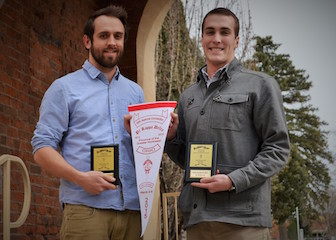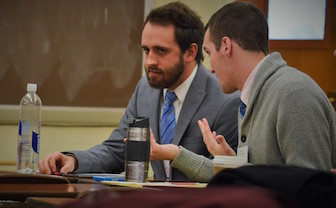Idaho State University debate captures national title at Pi Kappa Delta’s British Parliamentary Debate competition
March 17, 2015
Idaho State University seniors Patrick Loftus, from Coeur d’Alene, and Brock Sondrup, Idaho Falls, weathered a snow emergency and won the Pi Kappa Delta National Championship in British Parliamentary Debate, bringing home ISU’s first-ever national championship in debate.
“We’ve placed as high as third at CEDA Nationals in 2007. But, to my knowledge, the PKD win is our first-ever national title,” said Sarah Partlow Lefevre, director of the ISU James M. and Sharon E. Rupp Debate Society. “We are incredibly lucky to have such great success in our first year competing in British Parliamentary Debate.”
 The ISU team members also tied with each other for fourth-place speaker awards. Loftus and Sondrup traveled with two coaches and three other members of the ISU debate society to Ohio University to compete in the tournament in early March.
The ISU team members also tied with each other for fourth-place speaker awards. Loftus and Sondrup traveled with two coaches and three other members of the ISU debate society to Ohio University to compete in the tournament in early March.
Loftus and Sondrup competed for three days culminating in receiving the championship’s First Place, Top Superior Award in British Parliamentary debate award. British Parliamentary debate is team debate where four teams from different schools compete in a single round. The teams are then ranked from first place to fourth place and points are assigned. Loftus and Sondrup were ranked no. 1 in 75 percent of their debates. Tristin Herup-Wheeler and Aurora Zantman from Kuna and Mike Eyre from Boise also traveled to Ohio.
Examples of topics included: “This house believes a cut in military spending is necessary to fund social programs”; “This house would remove all nonmedical exemptions for vaccinations”; and “This house supports President Obama’s executive action on immigration.”
Debaters must be prepared to argue both sides of any topic. Topics are usually drawn from current events and recent news stories. Teams are assigned a position in the debate so they practice advocating for ideas they may agree or disagree with. The ability to debate both sides of a topic improves critical thinking skills and trains debaters to thoughtfully engage in public dialogue, according to Lefevre.
The tournament was hosted by the Pi Kappa Delta (PKD) debate honors society. The oldest national collegiate forensics organization, PKD is celebrating its 100th anniversary this year. The organization also sponsored the first national tournament. With more than 80,000 alumni, the PKD national tournament sponsored 513 entries in 13 different kinds of debate this year.
According to Scott Jensen, the National Tournament director, PKD welcomed 75 schools from 30 states and more than 2,100 entries in 23 different events.
The tournament host, Dan West from the Ohio University, said “This year’s impressive collection of more than 2,000 event entries makes this both the largest tournament in the United States for the 2014-2015 competitive season and the largest Pi Kappa Delta conference tournament to run in recent memory.”
Partlow Lefevre believes her team’s success is due to the hard work and talent of the debaters with a little bit of luck thrown in.
 “They are learning advocacy skills that will last long past graduation,” Partlow Lefevre said. “But, winning a tournament also involves an element of chance. You have to have the right topics on the right sides, ones the debaters feel comfortable defending. The positions assigned in debates and who the opponents are in particular debates also influence outcomes.”
“They are learning advocacy skills that will last long past graduation,” Partlow Lefevre said. “But, winning a tournament also involves an element of chance. You have to have the right topics on the right sides, ones the debaters feel comfortable defending. The positions assigned in debates and who the opponents are in particular debates also influence outcomes.”
Both members of the winning team plan to graduate in May. Sondrup’s degree will be in communication, media and persuasion. He will take a year off to work while he decides between law school and graduate school. Loftus is finishing a general studies degree and has been accepted to dental school. He will start at Midwestern University’s Glendale Campus after spending the summer with his family.
“Debate has provided an opportunity for me to compete and win,” Sondrup said. “But, more importantly, it has allowed me to develop advocacy skills that I can use in my future career. It is very cool to be able to say I won my last debate. Not many debaters can say that.”
Upon arrival in Ohio, there was little to no snow on the ground. As the team drove to their hotel about an hour from the Columbus airport, the snow began to fall on Wednesday March 4. By evening, there was enough snow in Athens County, Ohio, that tournament officials were concerned about their ability to proceed with the competition at Ohio University. As the national tournament committee began cancelling events for that day, they promised to reevaluate the situation the next morning. Snow continued to fall overnight.
By 10 a.m., Athens County had declared a Level 3 snow emergency making it illegal to drive on the roads and Ohio University had closed its campus for the day. The ISU debate team was staying in nearby Hocking County, which had declared a Level 2 snow emergency. This meant that the team could leave to hotel to seek out food and other necessities, such as ice scrapers for the rental cars. Nonetheless, they were unable to compete, the tournament was cancelled, and the Idaho State Debate team was forced to wait out the snow. Late Thursday, the team received good news that the debates would begin the next morning on Friday, March 6.
To learn more, follow the James M. & Sharon E. Rupp Debate Society, on Facebook, check out its blog at http://idahostatedebate.blogspot.com/, or email Partlow Lefevre at partsara@isu.edu.
Categories:
